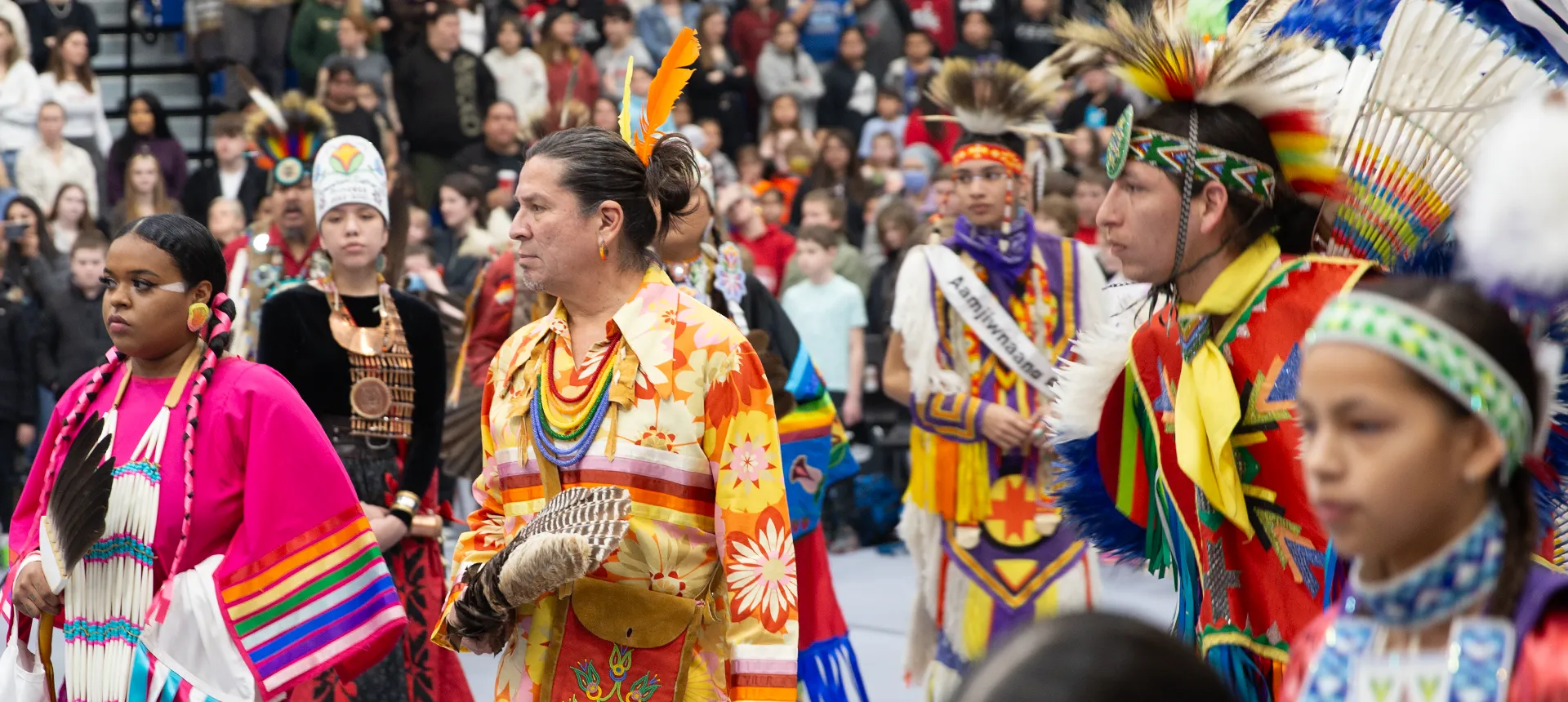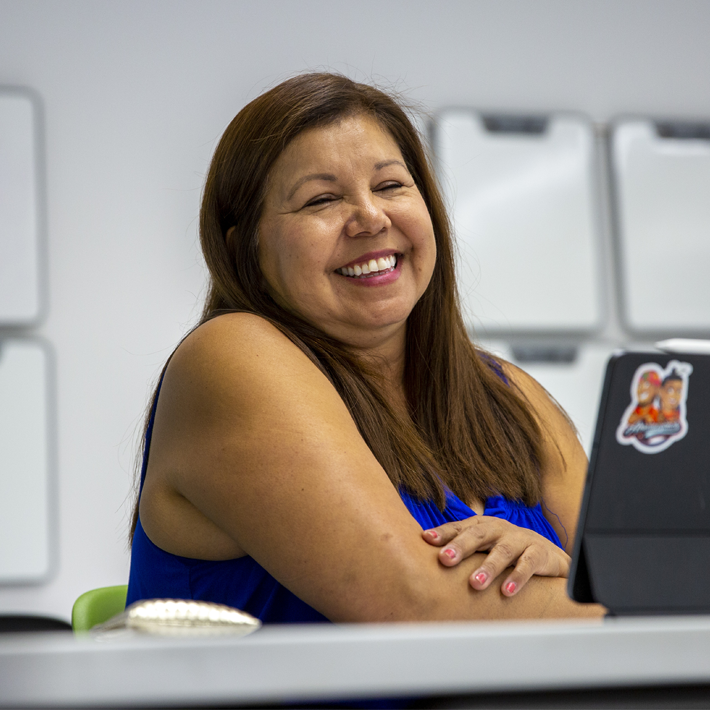

Liberal Studies - Indigenous Studies
Overview
An Indigenous-focused stream of the Liberal Studies diploma, featuring a built in 2+2 pathway for eligible graduates to obtain both their Ontario College diploma, plus an Honour Bachelor of Arts degree.
In response to the Truth and Reconciliation Commission, Lambton College is offering a dedicated stream of the Liberal Studies program that will address the university attainment gap for Indigenous students as well as, provide an opportunity for non-indigenous students to be better equipped to understand varied perspectives as daily life and mainstream employment intersect with Indigenous people.
Students will learn about the historical and contemporary relationships between Canada and Indigenous people as well as Indigenous ways of knowing. This diploma is filled with Indigenous-focused electives, alongside liberal studies courses, providing a well-rounded education that develops students' critical thinking.
A program built with pathways in mind, eligible graduates can continue their educational journey toward earning an Honours Bachelor of Arts in Indigenous Studies degree with McMaster University or a Bachelor of Arts in Indigenous Studies from Wilfrid Laurier University.
Credential Awarded
Graduates of this program are awarded a Liberal Studies Ontario College Diploma.
Admission Requirements
O.S.S.D. or equivalent with:
- Grade 12 English C or U
Mature Student Assessment for this program is available in the subject of English for the purpose of demonstrating proficiency in this required admission subject. For all other admission requirements, applicants must complete the required course(s) as listed above. For more information, please contact counselling@lambtoncollege.ca. Review the Mature Student Admission process.
Academic admission requirements can be obtained through Academic Upgrading and the Pre-Programs at Lambton College.
College Diploma to University Degree in Four Years
Lambton College is working in partnership with Wilfrid Laurier University and McMaster University providing an opportunity for students to enrol in the Liberal Studies - Indigenous Studies pathway. This 2 + 2 pathway to Indigenous-focused degree programs allows students to complete a diploma and a university honours degree in four years.
Students who graduate with an overall 75% are eligible to apply to one of the following:
- Wilfrid Laurier University
- Bachelor of Arts in Indigenous Studies
- McMaster University
- Honours Bachelor of Arts - Indigenous Studies
Costs
- Year 1 $4,156.71
- Year 2 $4,066.68
Please Note: These fees apply to the 2025-2026 academic year and are subject to change. Fees do not include books (unless specifically noted), supplies or living costs.
Technology Requirements
In order to keep pace with the requirements of each and every course in your program, Lambton College requires that each student have access to a laptop while studying at our college.
Courses
In term three, students can choose one elective. Visit the More Information tab to view the Elective Options.
Introduction to Physical Anthropology
As Canadians move to recognize, rebuild, and construct a more equitable and sustainable future, ANT 1003 reminds us of our global and also personal interconnection to the world at large through the lens of human bio-cultural evolution, genetic inheritance, social and cultural innovation. Biodiversity, global responsibility and engaged interdependence are core themes running throughout ANT 100's learning outcomes and applied learning assignments (ALA). Each of the five units includes opportunities to apply learning through small group dialogue, gamification, and personal reflection with the goal of building greater self-awareness as part of a wider interdependent community.
Critical Thinking & Writing
This writing course challenges students to explore diverse opinions and articulate their own perspectives clearly and persuasively. Through critical reading, students will develop skills in synthesis, analysis, comparison, and response, striving for clarity and diplomatic expression of their opinions based on factual evidence. Students will practice various rhetorical strategies of persuasion and hone their writing to ensure precision and accuracy in their messages. This course lays the foundation for a subsequent research-writing course, equipping students with essential skills for academic success.
Psychology I
This course provides a foundational overview of psychology, exploring the biological and cognitive processes that underlie human behaviour and experience. Students are required to purchase the assigned textbook to be successful in the course.
Indigenous Family Structure
This course explores the general impacts of colonization and the Canadian Child Welfare System on Indigenous parenting of First Nations, Metis, and Inuit (FNMI) societies through an analysis of pre- and post-contact. Students are introduced to Indigenous Worldviews and explore historic and systemic racism from a trauma informed lens. As part of the overall learning, students participate in Indigenous learning methodologies.
Indigenous Wholistic Practices
Examine a wholistic view of land based health and wellness as practiced by Indigenous Peoples past, present, and future. Analyse the impact of colonization and associated ethical impacts. Define wholistic health and wellness for community, individuals, and society.
General Mathematics I
This general course in mathematics reviews and enhances topics in arithmetic, algebra, linear graphs, measurement, and statistics. A problem solving approach is used throughout the course, and there are many practical applications.
Communications for Community Services
This course enhances students' research and communication skills in preparation for work in community services. Through the theme of "advocacy and education," students gather, analyze, and respond to recent and relevant research in their field, creating research reports and research presentations to share with their peers. The research process provides students with the opportunity to develop their writing skills through critical thinking, analysis, synthesis, application, and evaluation. These skills are necessary for success in current and future college courses, the workplace, and students' personal lives.
Human Relations
This course provides a forum for enhancing students' abilities and understanding of the value to human social interaction through communication and connection. This course places a strong emphasis on applied learning in the context of communicating with others, recognizing that personal development evolves from social interaction. Course topics include the study of emotion-focused brain functionality, self-understanding and awareness, understanding the importance of perception skills in relationships, developing strong verbal and nonverbal communication skills, recognizing prosocial leadership skills, understanding and establishing healthy team dynamics, and addressing conflicts in relationships.
Impacts - Truth & Reconciliation
Examine historical context and content contributing to development and implementation of residential schools in Canada. Holistically explore the impact of law, colonization and the resulting cultural genocide in Canada. Analyze the findings of the United Nations Declaration on the Rights of Indigenous Peoples and the Truth and Reconciliation Commission and resulting 94 Calls to Action.
First Nations, Metis & Inuit Perspectives
Examine First Nations, Metis, and Inuit (FNMI) societies' pre and post contact. Critically analyse impacts of colonization on First Nations, Metis, and Inuit peoples. Explore cultural, political, social, and economic perspectives relevant to FNMI peoples. Critique generational impacts and examine the relevance of measures such as the Truth and Reconciliation Commission and the United Nations Declaration on the Rights of Indigenous people.
Sociology I
Focusing on the Canadian perspective SOC 1003 explores the intersectional influences on behavior within the context of human group life. The sociological perspective, data collection, socialization, crime, and the dynamics of group structure and stratification are critically assessed against the backdrop of global interdependence and socio-cultural change. Small group discussion and gamification of materials all offer an enhanced course experience for individual growth and understanding of sociology.
Canadian Politics & Government I
Through the lens of intersectionality POL 1003 examines the structure and function of government within Canada. The Constitution, federalism, the Charter of Rights and Freedoms, the electoral system and political participation are all used to frame a critical review of Canada's role in global sustainability, socio-economic interdependence, and decolonization. Regionalism, cleavages, and disadvantage are core themes further explored by learners through small group dialogue, gamification, and a critical analysis of current event topics which have included Indigenous rights; gender identity; Residential Schools; and structural racism. If you're looking to make a difference... look to POL 1003
Indigenous Connection to the Land
Critically evaluate the impact of law, colonization, and treaties for Indigenous and Canadian citizens. Examine a variety of treaties that have influenced society and their resulting conflict of interests as demonstrated within current law.
Indigenous Peoples Media & Art
Examine a wide variety of media and artistic sources that have influenced Canadian and Indigenous societies. Analyze the power dynamics influencing Canadian society, past, present, and future, and critique the respective generational impact on Indigenous Peoples.
Elective - Select 1
Introduction to Cultural Anthropology
Employing the anthropological perspective this course examines culture and culture "life ways" through the lens of engaged interdependence, global socio-economic sustainability, and inclusion. Cross-cultural comparison, the nature of world order, decolonization, and the construction of identify and gender through culture are core themes running throughout ANT 200's learning outcomes and applied learning assignments (ALA). Each of the five units includes opportunities to apply learning through small group dialogue, gamification, and personal reflection, with the goal of building greater self-awareness as part of a wider interdependent community.
Canadian Politics & Government II
Responsible global citizenship, active political engagement, and the construction of a sustainable and inclusive society for all Canadians are core themes in POL 2003. Using intersectionality as a lens learners will examine the branches of Canadian government and political socialization while developing the tools to critically assess the roles played by mass media, public opinion polls and advocacy groups in shaping Canadian politics. Opportunities to apply learning through small group discussion, gamification, and critical analysis of current events specific to the Canadian experience are found throughout this course and have included topics such as: international terrorism; globalization; U.S Relations; and Indigenous identity. If you're looking to change the system, POL 2003 can show you where to start.
Psychology II
This course introduces students to key areas of psychology related to lifespan development, personality, motivation and emotion, social influence, as well as psychological disorders and treatments. Students will gain a broad understanding of how these factors influence human behaviour and mental processes. Students are required to purchase the assigned textbook to be successful in the course.
Global Citizenship First Nations, Metis & Inuit Perspectives
Explore the broad impact of globalization on First Nation, Métis, and Inuit peoples in Canada. Examine the revitalization of Indigenous knowledge and ways of knowing and being (ontology and epistemology) in Canada and abroad and explore its influence on the notion of 'Global citizenship' that provides a framework to facilitate restoration of balance, sustainability, and conservation for future generations. Implement an experiential learning opportunity (e.g., culminating project) within community demonstrating the value of Indigenous Knowledge (e.g., global citizenship engagement).
First Nation Languages - Resilience & Reclamation
Explore First Nations languages traditional to Turtle Island (North America) reflecting on origins, teachings, and storytelling. Holistically examine the colonial impacts and the resilience, resurgence, and reclamation of First Nations languages.
Contact
School of Business and Sustainability Leadership
Room B2-106
Program Information
After Graduation
Employment Opportunities

Our graduates use the Liberal Studies program to transfer to university or college diploma programs. Some graduates opt to enter direct employment. Recent data shows that Liberal Studies graduates are in high demand in a number of sectors, for instance, in the technology field. Graduates can also be found in community agencies, administration, marketing, education and social services.
College Diploma to University Degree in Four Years
Lambton College, in partnership with Wilfrid Laurier University and McMaster University, provides an opportunity for eligible graduates. This 2 + 2 pathway to Indigenous-focused degree programs allows students to complete a diploma and a university honours degree in four years. Students who graduate with an overall 75% are eligible to apply to one of the following:
Wilfrid Laurier University - Bachelor of Arts in Indigenous Studies
McMaster University - Honours Bachelor of Arts - Indigenous Studies
Students who complete the 2+2 Indigenous Studies pathway are now eligible for acceptance into McMaster University’s Master Of Arts, Indigenous Studies program.

More Information
Indigenous-Focused General Education Electives
Indigenous Family Structure
This course explores the general impacts of colonization and the Canadian Child Welfare System on Indigenous parenting of First Nations, Metis, and Inuit (FNMI) societies through an analysis of pre- and post-contact. Students are introduced to Indigenous Worldviews and explore historic and systemic racism from a trauma informed lens. As part of the overall learning, students participate in Indigenous learning methodologies.
Global Citizenship FNMMI
Explore the broad impact of globalization on First Nation, Métis, and Inuit peoples in Canada. Examine the revitalization of Indigenous knowledge and ways of knowing and being (ontology and epistemology) in Canada and abroad and explore its influence on the notion of 'Global citizenship' that provides a framework to facilitate restoration of balance, sustainability, and conservation for future generations. Implement an experiential learning opportunity (e.g., culminating project) within community demonstrating the value of Indigenous Knowledge (e.g., global citizenship engagement).
First Nations Languages
Explore First Nations languages traditional to Turtle Island (North America) reflecting on origins, teachings, and storytelling. Holistically examine the colonial impacts and the resilience, resurgence, and reclamation of First Nations languages.
Impacts of Truth & Reconciliation
Examine historical context and content contributing to development and implementation of residential schools in Canada. Holistically explore the impact of law, colonization and the resulting cultural genocide in Canada. Analyze the findings of the United Nations Declaration on the Rights of Indigenous Peoples and the Truth and Reconciliation Commission and resulting 94 Calls to Action.
Indigenous Peoples Media & Art
Examine a wide variety of media and artistic sources that have influenced Canadian and Indigenous societies. Analyze the power dynamics influencing Canadian society, past, present, and future, and critique the respective generational impact on Indigenous Peoples.
Indigenous Holistic Practices
Examine a wholistic view of land based health and wellness as practiced by Indigenous Peoples past, present, and future. Analyse the impact of colonization and associated ethical impacts. Define wholistic health and wellness for community, individuals, and society.
First Nations Perspectives
Examine First Nations, Metis, and Inuit (FNMI) societies' pre and post contact. Critically analyse impacts of colonization on First Nations, Metis, and Inuit peoples. Explore cultural, political, social, and economic perspectives relevant to FNMI peoples. Critique generational impacts and examine the relevance of measures such as the Truth and Reconciliation Commission and the United Nations Declaration on the Rights of Indigenous people.
Indigenous Connection to the Land
Critically evaluate the impact of law, colonization, and treaties for Indigenous and Canadian citizens. Examine a variety of treaties that have influenced society and their resulting conflict of interests as demonstrated within current law.
Technology Requirements
It is recommended that students purchase a laptop with a Windows operating system.
Internet Speed Requirements
For best performance for students learning remotely, an internet connection with a minimum of 40 Mbps download and 10 Mbps upload speed is recommended in order to effectively use video conferencing and remote lecture delivery software as well as, other online resources remotely. Due to the large area over which students may be dispersed, we are unable to recommend a specific provider, so you will need to inquire around your area to find one that best suits your needs.
Minimum Laptop Requirements
In order to access the internet and virtually-delivered software and courseware, student laptops should include the following at a minimum. By meeting the following specifications, students will be equipped to access software and courseware on their laptop through the internet:
- Intel i5 8th Gen Processor or equivalent
- 16 GB of RAM (with a minimum of 8 GB)
- 100 GB HDD or more
- HD Graphics
- Webcam with a microphone
- Wireless 802.11n/ac 5ghz capable
- Windows Operating System (Windows 11)
Please note that Chromebooks and MacBooks may not support all software required for your program; students should verify compatibility with their professors.
Software
To ensure students are getting the most our of their classroom experience, some software will be required.
Lambton College has made this software easily accessible online. Students can leverage our Microsoft Office 365 software packages and services. In addition, much of the software you require for your courses will be available on demand for use on any device - on or off campus.